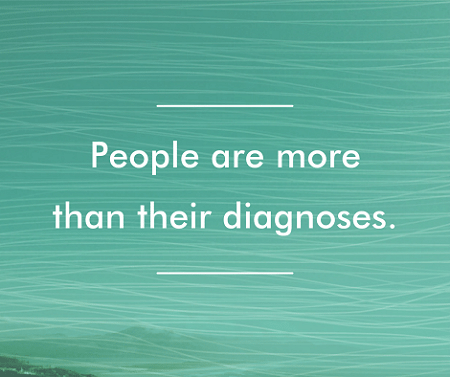5 Ways To Challenge Mental Health Stigma
Requests: 0
Views: 4
If you are experiencing or have a history of mental illness, what are comments you’ve received from your family or friends?
“Why can’t you just be happy?”
“She’s just looking for attention.”
If you are experiencing or have a history of mental illness, what are comments you’ve told yourself?
“Why try? I’m not good enough.”
“No one will love me looking like this.”
These are just a few examples that came to mind. Individuals experience negative stereotypes because others perceive them as "different." Stigma is the process of distinguishing and labeling group differences, stereotyping and separating "us" vs. "them," as well as status loss and discrimination.
 In America, 1 in 5 adults will have a mental illness during their lifetime. Nearly 60% of adults with mental illnesses do not receive treatment in a given year. Stigma generates shame, hopelessness, exclusion, lack of social support and low self-esteem. Those impacted by stigma are less likely to seek help and accept help if offered.
So how do we fight stigma? I have been a member as well as president of the Active Minds chapter on my university’s campus, and if anyone is familiar with the organization, you'll easily recognize the phrase "Stigma Fighter." It's a name I proudly call myself, and it adequately describes the battle needed to challenge mental health stigma. I encourage you to become an advocate and fight the stigma surrounding mental health.
Here are five ways to challenge mental health stigma:
In America, 1 in 5 adults will have a mental illness during their lifetime. Nearly 60% of adults with mental illnesses do not receive treatment in a given year. Stigma generates shame, hopelessness, exclusion, lack of social support and low self-esteem. Those impacted by stigma are less likely to seek help and accept help if offered.
So how do we fight stigma? I have been a member as well as president of the Active Minds chapter on my university’s campus, and if anyone is familiar with the organization, you'll easily recognize the phrase "Stigma Fighter." It's a name I proudly call myself, and it adequately describes the battle needed to challenge mental health stigma. I encourage you to become an advocate and fight the stigma surrounding mental health.
Here are five ways to challenge mental health stigma:
 In America, 1 in 5 adults will have a mental illness during their lifetime. Nearly 60% of adults with mental illnesses do not receive treatment in a given year. Stigma generates shame, hopelessness, exclusion, lack of social support and low self-esteem. Those impacted by stigma are less likely to seek help and accept help if offered.
So how do we fight stigma? I have been a member as well as president of the Active Minds chapter on my university’s campus, and if anyone is familiar with the organization, you'll easily recognize the phrase "Stigma Fighter." It's a name I proudly call myself, and it adequately describes the battle needed to challenge mental health stigma. I encourage you to become an advocate and fight the stigma surrounding mental health.
Here are five ways to challenge mental health stigma:
In America, 1 in 5 adults will have a mental illness during their lifetime. Nearly 60% of adults with mental illnesses do not receive treatment in a given year. Stigma generates shame, hopelessness, exclusion, lack of social support and low self-esteem. Those impacted by stigma are less likely to seek help and accept help if offered.
So how do we fight stigma? I have been a member as well as president of the Active Minds chapter on my university’s campus, and if anyone is familiar with the organization, you'll easily recognize the phrase "Stigma Fighter." It's a name I proudly call myself, and it adequately describes the battle needed to challenge mental health stigma. I encourage you to become an advocate and fight the stigma surrounding mental health.
Here are five ways to challenge mental health stigma:
1. Learn the facts
Educate yourself about mental health and mental illness. If you learn the facts, you can teach others.2. Speak up
Assist your friends or family members any time they display false beliefs or say stigmatizing and hurtful comments. Use this as a chance to educate and challenge. Many times people are misinformed and do not know that what they believe to be true is really just stereotypes and misconceptions. Test any false and stigmatizing comments and images portrayed in the media.3. Language matters
Become aware of the language you use. Generic labels like “crazy” can be disrespectful and further increase stigma. Put people first, not their conditions. For example say, "person with anorexia" rather than "anorexic." [Ed note: while this is a good practice for eating disorders, please keep in mind that some people with other disorders (e.g., autism) may prefer identity-first language. When in doubt, ask (respectfully)!]4. Show empathy
Show respect, compassion and love toward others. Don’t label or judge. People are more than their diagnoses. Recognize that mental illnesses are treatable and very common—break the stigma with attitudes and behaviors.5. Talk
Share your story if you experience or have a history of mental illness. The best way to help others realize they are not alone is to talk openly about your struggles and triumphs. Mental health should not be a secret. The more people talk openly, the more likely someone else will be to seek help and remove the perception surrounding mental health. This article was originally posted on the website of our partner, Proud2BMe.Reactions